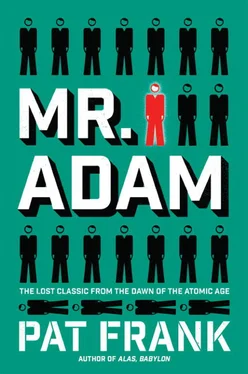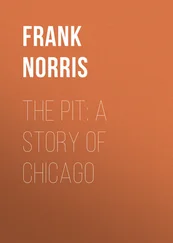“Take the glass out of his hand,” said Phelps-Smythe. A second lieutenant took the glass out of Homer’s hand, and they started again. “My dear Mr. Adam,” the general repeated, “I hope you are well.”
“Give me back my drink,” said Homer.
“Give him back his drink,” the general ordered the second lieutenant.
The photographer took another shot, and the second lieutenant gave the drink back to Homer.
“How are things?” the general inquired.
“Things are very drunk out today,” Homer said.
“What’s that?” said Phelps-Smythe. “What was that you said, Adam?”
“You can take the National Research Council, plus three large cyclotrons, and you can—” I don’t think there is any use repeating what Homer told Phelps-Smythe, because such things are said every day. But Homer Adam’s saying them was new. So I listened.
Phelps-Smythe puffed out like a turkey gobbler trying to impress his hens with his bravery. “Adam,” he said, “we are through with all this damn foolishness. From now on, Adam, you’ll take orders! By God, you will!”
“He will indeed!” General Kipp agreed.
“No,” said Adam, “I won’t.”
Phelps-Smythe felt around in his pockets and came up with a mimeographed sheet of paper, legal size. He put his heels together and read from it as if it were the Articles of War. “This,” he began, “is the directive prepared by the War Department and signed by the President:
SUBJECT: HOMER ADAM.
1. Homer Adam, civilian, is hereby declared Class AAA Strategic Material vital to the defense of the United States.
2. The Department of War will be responsible for the maintenance and security of this property.
3. Homer Adam, civilian, will at all times be subservient to, and conduct himself according to whatever rules and regulations shall be promulgated by the Chief of Staff, or Adjutant General, to carry out the purpose of Paragraphs 1 and 2.
4. The National Research Council shall have the opportunity to use said Homer Adam for purposes of research upon the approval of the Joint Chiefs of Staff, but this in no way shall interfere with Paragraph 2.”
Phelps-Smythe folded his directive, and tucked it into a hip pocket. “There,” he said, “now you see.”
“Now I see what?” said Homer.
“Now you see where things stand. I guess that directive is pretty air tight, isn’t it, General?”
“I’ll say it is,” said General Kipp. “That doesn’t leave any doubt about who’s in control. The N.R.C. can’t do a damn thing until they’ve got approval from the Joint Chiefs.”
Adam was thinking. “Does that mean,” he asked, “that nothing is going to happen?”
“Certainly not!” Phelps-Smythe said. “That only means that before the N.R.C. can do anything it has to have the approval of the Joint Chiefs of Staff, which means Army, Navy, and Air. And of course before the Joint Chiefs approve anything it will require a staff study from each branch of the service, and proposals will have to be made by the experts in each branch, and it probably will require special surveys to find the effect on the existing situation. Furthermore, public opinion must be considered. That’s why we have a Public Relations Branch, and in addition, the international situation cannot be overlooked. And of course the whole thing will have to be co-ordinated with the War Plans Division. Isn’t that so, General?”
“That is it, precisely,” said General Kipp.
“Why can’t I take a little vacation?” Homer asked.
“Vacation!” shouted Phelps-Smythe. “Vacation! Now let me tell you, young man, this foolishness is all over. From now on your life is strictly business. Right at the first, I think we’ll send you to one of the O.C. camps and give you a little basic training. Do you good. Just what you need. Knock this cockiness out of you.”
“I won’t do it,” said Homer.
“You won’t do it!” exploded Phelps-Smythe. “From now on you haven’t got anything to say about what you’ll do or won’t do.”
“Oh, yes I have,” said Homer. “If you keep on being nasty, I won’t eat.”
Phelps-Smythe started to say something, but General Kipp checked him and told Homer, “Now we don’t want any trouble, Adam. We’re only doing our duty as soldiers, you know. Come on, let’s get going.”
So they took Homer away. Just as he left, Phelps-Smythe turned to me and said, “Remember, Smith—you and that Red secretary of yours—all this is Top Secret.”
Marge made a face at him, but I don’t think he noticed it.
We caught the Congressional back to New York. It didn’t take us long to get out of the hotel, because Marge had done most of the packing the night before. This I laid to intuition, but she denied it, and said it was only common sense. She claimed that I was addled, perhaps by strain, and wasn’t able to see things with the proper perspective. She said that immediately after a man is kicked in the teeth by a woman, a great clarity creeps into his brain, and that this clarity persists until scar tissue—in the shape of another woman—grows over his memory.
Just before we got on the train I bought a late edition of an evening paper. The headline said: “ADAM BALKS; A.I. OUT!” and under this was another headline, which read: “Army Takes Over; President for N.R.C.” There was a front page editorial, entitled, “No Cause for Alarm.”
So we settled down in the brownstone house on West Tenth Street, first floor; the bed known as Smith Field, and resumed our normal mode of living. I found myself doing eight hours of rewrite a day, and liking it. It was like occupational therapy. I wrote about the opening of the state trout season, and I covered the Easter Parade on Fifth Avenue, and I wrote a piece about the selection of the country’s ten best-dressed men.
I rewrote our cables from Delhi and Chungking about the famine, but of course that could hardly be considered news, because it was a running story, the same day after day. I wrote about the over-production of pigs, and the shortage of meat; the bumper wheat crop, and the possible rationing of bread; the need for subsidies for the Southern cotton farmers, and the black market in textiles; our record employment, and our record poverty. In God’s Country everything was normal, and for a considerable space of time nothing disturbed our American Way of Life.
I kept an eager eye open for dispatches from Washington about Mr. Adam. In the AP report, you could always find the slug, “Adam.” Even when there was no news of Homer, I knew that somebody in the AP Bureau in Washington had to sit down and write a piece about him, and his progress, every night, and around noon some reporter sat himself before a typewriter, confronted by a slug saying, “New lead Adam.”
So I kept watching Adam, just as a released suspect in a murder keeps alert for news of the crime. Mostly, the Adam stories were wooden and almost newsless. The N.R.C. was confident that, now it had been placed in charge of Adam, science would solve the riddle of what had happened to the world post-Mississippi. The N.R.C. had enlisted all the top scientists of the country in the scientific battle for re-fertilization. The N.R.C. requested more funds from the President, and claimed it must expand to meet the crisis.
Having once been stricken with the disease, I found the symtoms familiar. I was not overly surprised when one day I read, in a single paragraph on page twenty-two of the World-Telegram , that Percy Klutz, formerly of N.R.P., had joined N.R.C. as administrative assistant. Nor was I surprised when I read that Nate Gableman, an experienced public relations expert, had been loaned to N.R.C. by the Department of the Interior, where he had just arrived from N.R.P. Prior to that, Gableman had held a number of government positions. About a half dozen of them were listed.
Читать дальше












